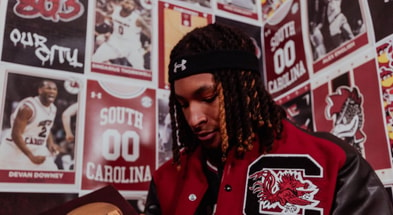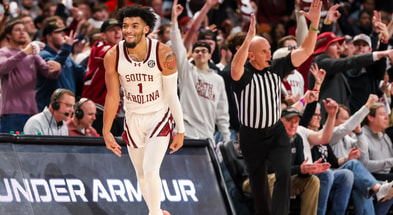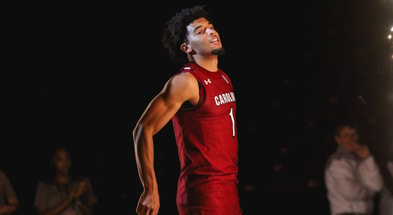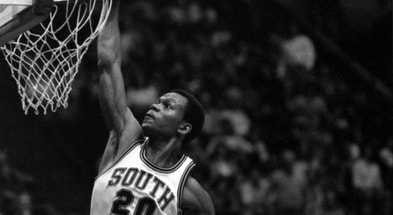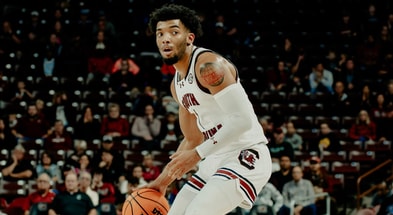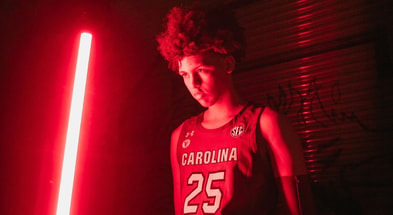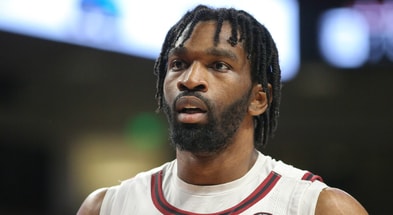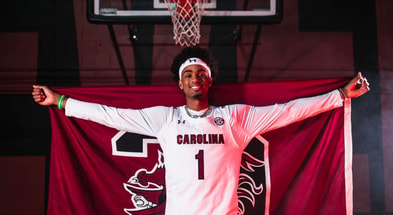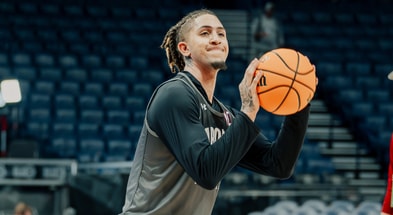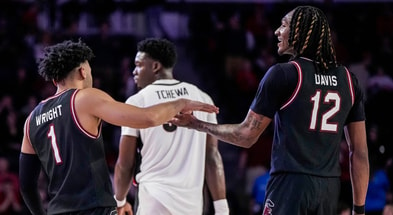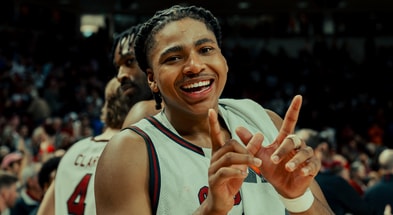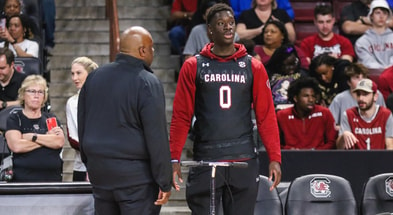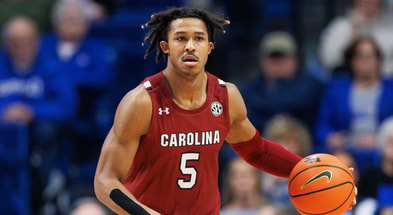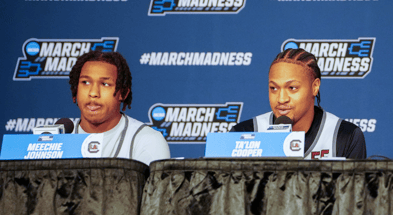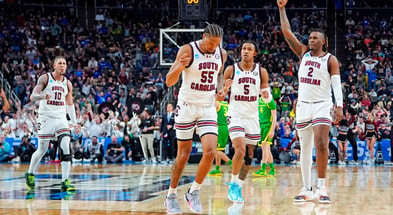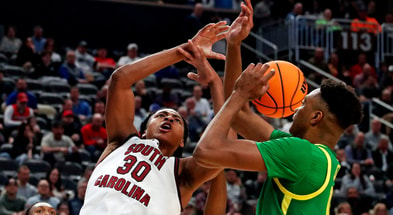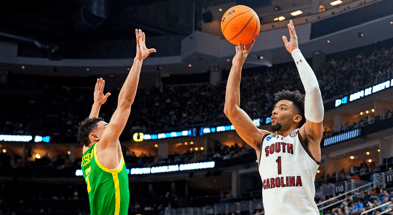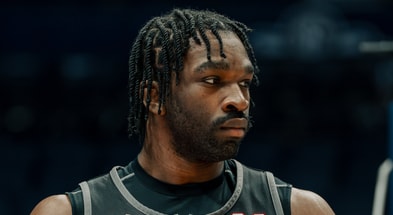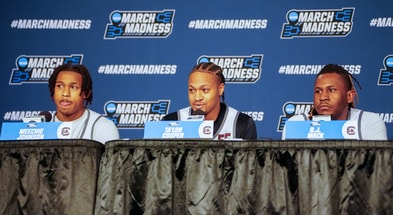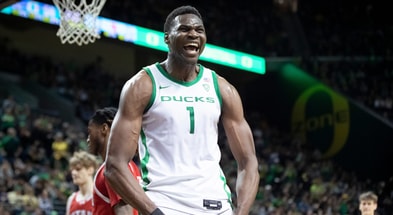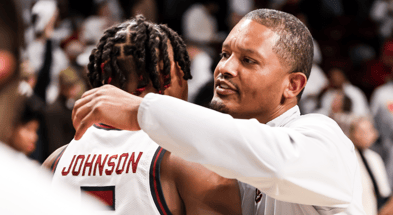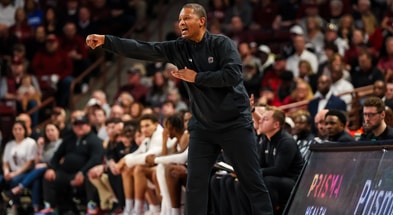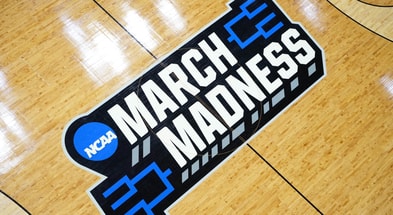"Joy reigns in Columbia": Antonio Grant, 26 years after his unforgettable game clincher
Alan Piercy is the author of A Gamecock Odyssey: University of South Carolina Sports in the Independent Era (1971-1991). The following was originally published on Alan’s South By Southeast newsletter.
Alan will be in Columbia for three events this weekend to promote the book:
- Friday night at All Good Books in Five Points from 6-8 p.m., Alan will talk with Bob Gillespie, former Senior Sports Writer with The State, about the book with a book signing afterward. (More info here.)
- Saturday morning, USC Press will have a booth at Soda City Market, and Alan will be there most of the morning.
- Barnes & Noble at Russell House will have a booth on the concourse of CLA prior to both the men’s game vs Vanderbilt on Saturday and the women’s game vs UConn on Sunday. Alan will be there to meet and greet and sign any books purchased.
Former Gamecock great Antonio Grant reflects on basketball and life, 26 years after his unforgettable game clincher against Cincinnati
Twenty-six years melt away in an instant when you view it on YouTube. The video, from Feb. 1, 1998, is a time capsule of sorts. Though somewhat grainy from time and the long-since obsolete technology that recorded it, you are no less captured by the scene as it plays out.
The CBS camera zeroes in, first on the Cincinnati huddle, then South Carolina, as head coaches Bob Huggins and Eddie Fogler instruct and cajole their respective clubs with under five seconds remaining in the ballgame.
The camera pans out to a near capacity Frank McGuire Arena, that old gem of a venue. The arena floor is resplendent with that familiar garnet triangle – the outline of the State of South Carolina at mid-court. The pep-band plays a jaunty rendition of “2001.” Fans stand, exhausted by the afternoon’s drama, anticipating what might come next, knowing whichever way it went it would be over soon.
The CBS announcers, Barry Tomkins and Jimmy Dykes, recap the events which led to the coming final play. 18th-ranked Cincinnati, that old foe of Metro Conference days, had dominated the 13th-ranked Gamecocks early, holding USC to an ice-cold twenty percent shooting in the first half as they built a twenty-point lead by intermission. Fogler, calm and unflappable, told his team at halftime to “work at it, chip away.”
Less than a minute into the second half, the Bearcats extended their lead to 23.
From there, the Gamecocks methodically chipped away as their coach implored, while Cincinnati went cold. When redshirt freshman Antonio Grant sank a three-pointer at the 16:27 mark, trimming the deficit to seventeen at 47-30, a comeback suddenly seemed possible.
The big crowd stirred from its afternoon malaise.
A Recus Nix free throw capped an old-school three-point play at 10:29, trimming Cincinnati’s lead to thirteen, 54-41. At 8:36, senior captain Melvin Watson drilled a three from the top of the key, cutting the deficit to single digits, 54-46.
“Work at it, chip away.”
A few minutes later, Watson hit a runner from the lane to cut it to five, 59-54. Two Grant free throws cut it to three at the 1:07 mark, 65-62, leaving Cincinnati coach Huggins “squirming on the bench and watching fouls mount,” according newspaper accounts. Watson next hit a 15-footer at the 0:44 mark, slicing the Cincy lead to a single point, 65-64. Energy surged through the arena like a pent-up beast.
After an exchange of turnovers, Cincinnati’s Bobby Brannon had possession with ten seconds remaining, needing only to hold the ball, forcing the Gamecocks to foul. An 84% free throw shooter, Brannon would all but certainly have iced the game away. Instead, as The State’s Kamon Simpson wrote, Brannon “went for the kill,” driving the lane. Waiting in the paint, Antonio Grant.
Charge. Gamecock ball.
Following the timeout, Grant inbounded to BJ McKie under heavy Bearcat pressure with 0:04 remaining. McKie stumbled, somehow managing to keep his dribble before shoveling the ball to Grant at the top of the key. “I don’t know if it was me tipping it, or if the man upstairs just rolled it to him,” McKie told reporters after the game.
There was no time to think for Grant, only to grab the ball and shoot over the outstretched hand of Cincinnati’s Michael Horton.
The State’s Simpson wrote of the moment,
“And everyone – from referee Gerald Bourdeaux to the ten exhausted players on the floor to the 11,014 emotionally spent fans at Frank McGuire Arena, were transfixed watching it drift.
Toward the basket.
Toward one of the largest comebacks in school history.
By the time Grant released the ball, the clock ticked to zeros. Everyone in the building stood like defendants in a courtroom, following the ball on its arcing path toward a high-stakes verdict.
Then, swish.
The Gamecocks took their only lead of the afternoon, 67-65.
Bedlam ensued. The State’s Bob Spear, in a moment of alliterative indulgence, wrote that the moment unleashed an “extemporaneous exhibition of euphoria,” as USC players and fans alike mugged Grant in a wild court storming for the ages.
“I’ve got knots on my forehead from people jumping all over me,” Grant told reporters after the game, “I just held my head down. I was ready to get out of there.”
Tomkins and Dykes of CBS seemed as overcome as the crowd, nearly lost for words by the magical comeback and the frenetic release of joy on the Coliseum floor that followed, Tomkins exclaiming of Grant, “You are big man on campus, son!”
For several minutes replays showed Grant’s epic shot from every angle available, and the joyful riot which followed. Nobody wanted the moment to end. Not fans, not even the Tomkins and Dykes it seemed. But as CBS prepared to shift coverage to the more serene environs of the Pebble Beach Pro-am golf tournament, Dykes signed off in the only way he could among the ongoing celebration.
“Joy reigns in Columbia.”
Looking back on a life in basketball
For most Gamecock fans old enough to remember, the mention of Antonio Grant triggers an instant flashback to that moment. One shot during one game of a redshirt freshman season. A moment in time, suspended in amber.
But there’s a lot more to Antonio Grant than the “Miracle at McGuire,” as The State’s Simpson coined it those many years ago.
Born to parents Ceasar and Rosetta in Augusta, Georgia, Grant’s story is one of early mistakes and second chances, of growth and hard work. It’s an epic come from behind story much like his most famous moment back in 1998.
Grant played football and basketball growing up, but didn’t get serious about it until well into high school. The most notable athlete in the family was his older brother, Ceasar, who was a standout at North Augusta High School.
“I only played a year and a half in high school in North Augusta. I pretty much was a street kid. I was kinda troubled as a youth. I used to go to the courts and play and some of the older guys would say, ‘yeah, you got all that talent, but you’re not doing anything with it.’”Grant continues, “I was expelled, my grades weren’t good. I was young, I didn’t care. But maybe a year or two later I said ‘Ok, I want to play,’ So [the coaches] said ‘You’re gonna have to go to summer school and play catchup, and then you’re gonna have to show that you can stay out of trouble and make good grades.”
Grant put in the work to improve his game and his grades. Soon, scouts took notice. He averaged 24.3 points, 18 rebounds, and six assists as senior at North Augusta High School, earning team MVP, all-state and all-region honors for the second year in a row. Though his path toward a Division I scholarship would not be without additional detours, for the first time, he began to see a path for himself to better things through basketball.
“Work at it, chip away.”
Still needing to shore up his academic credentials, Grant landed at New Hampton Prep School. There, among the snowy White Mountains of New Hampshire, Grant continued his reclamation project with great success, averaging 22 points, 13 rebounds and over five assists per game. He led the team to a 22-3 record, the New England prep school championship, while garnering New England Player of the Year honors.
Grant received interest from South Carolina, Georgia, Tennessee, and Notre Dame. Born in Augusta, and spending most of his life straddling both sides of the Savannah River, he ultimately chose the Gamecocks, who were on the rise under fourth-year head coach, Eddie Fogler.
After two rebuilding seasons, Fogler’s third Gamecock squad compiled a 19-12 (8-8) record, earning an NIT bid, and coming within a basket of a semi-final birth. The former Tar Heel player and long-time assistant to coach and mentor, Dean Smith, Fogler had established himself as a builder of programs at two previous stops at Wichita State, and SEC rival Vanderbilt. By his final season in Nashville, Fogler received national coach of the year honors after leading the Commodores to an SEC championship and Sweet Sixteen appearance. He was following the same pattern at South Carolina, rehabilitating the Gamecock program from the low ebb of Steve Newton’s dismal two-year tenure at the dawn of Carolina’s SEC membership.
Fogler engineered the turnaround of his Gamecock program with mostly in-state talent, notably BJ McKie of Irmo, Melvin Watson of Charleston, William Gallman of Chester, Herbert Lee Davis of Georgetown, and Hagen Rouse of Greenville.
Larry Davis, a Demark, South Carolina product transferred to USC from North Carolina, and he along with McKie and Watson combined for perhaps the nations most dynamic backcourt over two seasons in 1995-96, and 1996-97. Grant, with his North Augusta roots, fit right in.
Those Sandlappers, combined with six-seven forward LeRon Williams of Bradenton, Florida, and a trio of six-eleven centers in Ryan Stack of Chapmansboro, Tennessee, Nate Wilbourne of Columbus, Ohio, and George Formanek of the Czech Republic, combined to create a magical run for the ages for the Gamecocks in 1996-97.
After a shaky 5-5 start, which included ugly losses to UNC-Asheville and Charleston Southern, Carolina bolted to a 24-8 record, including a 15-1 showing in conference, the program’s first-ever winning SEC slate. The Gamecocks famously defeated Kentucky in Lexington on senior day, a feat nearly unheard of, to capture the university’s first SEC championship in any sport en route to earning a #2 overall seed in that season’s NCAA tournament, the highest ever for the program.
Unfortunately for Grant, a broken foot five games in kept him out of the action that season. He accepted a medical redshirt and witnessed that season’s magic from the bench. Grant says of that SEC championship team, “I think the coaching staff and everyone just kind of seemed to be on the same page.” He remembers laughter, and a kind of joy that can only come from winning.
Though Carolina’s NCAA tournament journey was a brief one, cut short by a shocker of an upset at the hands of Coppin State of the Mid-Eastern Athletic Conference, the ground work was set for continued success under Fogler, and the Gamecocks of 1997-98 would bear that out.
Fogler’s fifth Gamecock team went 23-9 (11-5), and earned a #3 overall seed in that season’s NCAA tournament. Though a second-straight SEC title eluded them, the 1997-98 Gamecocks were an exciting bunch and returned the bulk of the prior season’s championship roster. A healthy Grant provided not just one but two last-second game-clenching baskets in home contests against Florida, just one game prior to his heroics versus Cincinnati.
For a second straight season though, a deep NCAA tournament run was not in the cards, as the Gamecocks were surprised by Richmond, 62-61 in the first round of the East Regional. Despite that disappointment, Grant performed well in a redshirt freshman season that saw him post 6.6 points and 4.4 rebounds per game, while also contributing 39 assists and 19 steels, third and fourth on the team respectively. He was a clutch player with a knack for elevating his performance in big games, and he was the Gamecocks most versatile defender, adroitly covering opposing point guards small forwards alike. Grant earned SEC all-freshman honors for his efforts.
A difficult stretch and reflections on a coach
The next three seasons were difficult ones for the Gamecocks. Fogler’s final three squads compiled records of 8-21 (3-13), 15-17 (5-11), and 15-15 (6-10). Only the last of those reached the post-season, a first-round NIT loss to Connecticut in 2000-01.
A visibly exhausted Fogler, who had announced his resignation two days before the NIT game, said of his retirement after the defeat, “It is very difficult with college athletics being the way it is today and the pressures. You’re darned if you do, darned if you don’t. I’m leaving college basketball with my dignity, my integrity and my sanity.”
Of his relationship with Fogler, Grant reflects,
“I remember as a freshman Coach Fogler telling me, ‘Antonio, before you ever decide to turn back to the streets, come talk to me. If you need something, come talk to me.’ And as a kid, you know, somebody saying they’re gonna be there for you. I had never had someone do that, you know, because I lost my dad when I was like 19 years old. Although he and I may have bumped heads sometimes, but we had a really good relationship. I’ve got all the respect in the world for him, and I’ve still got love for him today.”
Pro ball and beyond
Grant says he never dreamed about playing in the NBA. But his interaction with a former Gamecock great piqued his interest in playing overseas. “I remember asking Terry Dozier when he would come back [to campus] in the summers and play – I knew he played overseas – and I was like ‘Terry, man, you think I could play overseas?’” Grand continues, “And he said ‘Absolutely.’” The conversations with Dozier as well as assistant coach John Cooper, who had also played in Europe, sparked a desire in Grant to continue his basketball career – to make a living playing ball.
Indeed, after a South Carolina career in which he compiled 822 points in 119 games, Grant played one season in the NBA’s Developmental League for the North Charleston Low Gators. He played for Coach Alex English, alongside former USC teammate BJ McKie, noting it was pretty cool to be with South Carolina’s all-time first and second leading scorers on the same team in McKie and English respectively.
From there it was onto Europe, where he spent 14 seasons. “I had a chance to see the world. The Lord blessed me with talent and I was able to use it to take me around the world,” he pauses in wonder thinking back on it before repeating. “I saw the world. [It was a] pretty cool way to make a living.”
Grant used the accumulated earnings from his long career to invest in rental properties back home. Beyond managing his investments, Grant felt the tug back to athletics in 2018 when he accepted the athletics director opening at Mead Hall Episcopal School in Aiken, a position he held until 2023. “So, I’m in my second retirement,” Grant quipped.
He’s enjoying the fruits of his labor now, spending time with his three daughters, and staying involved in the community, helping younger generations through mentoring and basketball. He tries to live by the pearls of wisdom once passed down by his former coach and mentor, English. “I remember Alex used to always say, ‘Guys, you need to live in the moment, be present in the moment.’ I didn’t understand that at the time, but now I know exactly what he was talking about.”
His story is one of redemption, of learning to work hard and taking advantage of the opportunities that present themselves. “As I’ve gotten older and I look back over my life, I know that I’ve had these things in me from when I was a kid. I know that you can do whatever you put your mind to doing if you’re willing to do the work.”
“Work at it, chip away.”
Its advice for the ages.
